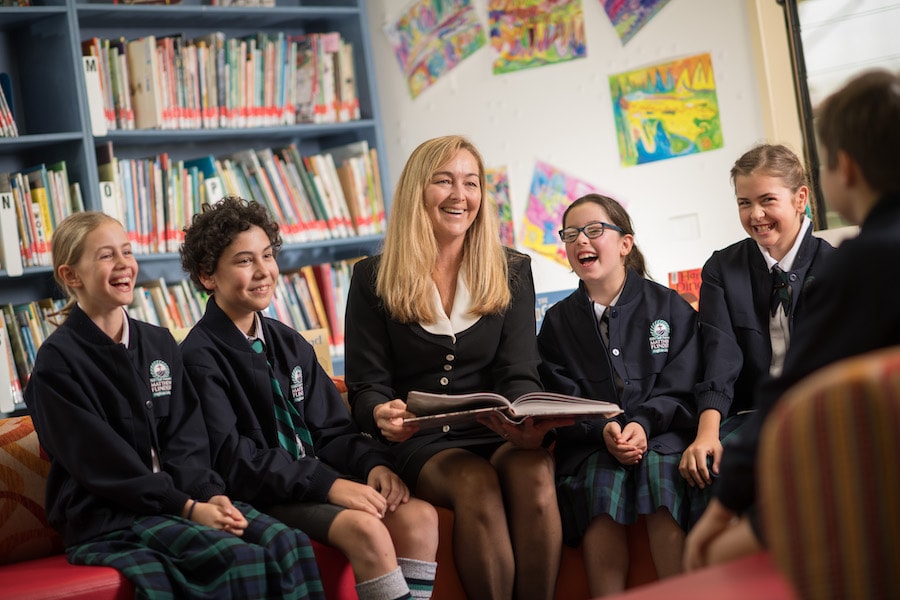As we move towards the end of another school year we also begin to prepare for our children’s transition to the next year level, a new teacher and class of peers. Some children worry about this change, however, there are many ways to support your child with their transition:
• Talk about school and their first day, how to introduce themselves and make friends and share your happy memories of school with your child.
• Build independence and confidence by enabling your child to participate in the organisation of their belongings for the new school year (e.g. purchasing a new lunch box, pencil case, uniform and school shoes, covering and labelling books and stationery). Setting up school morning and evening routines also supports the development of your child’s independence and confidence.
• Develop relationships within the school community by attending school events, information evenings, speaker series evenings, parent-teacher interviews, P&F meetings and enabling your child to become involved in opportunities to meet other students through their participation in co-curricular activities and Flinders sporting clubs.
• Celebrate starting school by counting down to the first day of the new school year and taking photos of your child’s first day. Starting school may be mixed with sadness about leaving their previous teacher and classmates (or leaving home or Primary School if your child is transitioning to Pre-Prep or Secondary School). It is natural that children may worry about what the new school year will be like. You can support your child’s wellbeing by talking about how they are feeling and why this might be, teaching them how and who to ask for help and making time to rest before the new school year begins.
Points of transition from Pre-Prep to Primary School and from Primary School to Secondary School are critical turning points in a young person’s life. School transitions mark a time of significant change for children. During these transitions, children will need time and support to adapt to their new social environment. They will also require guidance as they gradually take on new and increased responsibilities. At these transition points, there is a greater emphasis on children developing their independence and their skills towards becoming self-directed learners (Hanewald, 2013). Although some children cope positively with the upcoming challenges and opportunities, for others it can be a time of worry and stress as they develop new friendships and define their place in a new social hierarchy (Pellegrini and Bartini, 2000).
Starting school is an exciting and significant time in a child’s life. Building positive relationships between children, parents and teachers is unquestionably the most important aspect of ensuring a successful transition to a school for your child. Research has shown that children are more likely to be ready to learn and enjoy a lifelong love of learning if they have a positive experience transitioning to school. (Professor Bob Perry, 2015). There is also a greater likelihood that students will do better emotionally, socially and academically if they and their parents feel a sense of belonging and connectedness to the school community. The development of trusting and respectful partnerships between parents and staff is essential in supporting your child’s transition and ongoing education.
The transition period from Primary to Secondary School can be a vulnerable time as it coincides with developmental and socio-emotional changes associated with becoming adolescents (Hanewald, 2013). Adolescence is characterised by physical, psychological and social changes in which the reciprocal exchanges between the young person and the social context play an important role (Due et al., 2011). During puberty, adolescents naturally begin to disconnect from family and focus more on peer connectedness. The move to a larger Secondary School gives adolescents opportunities to make new friends from a larger pool of young people and hence find a peer group of like-minded friends with similar interests. The transition to Secondary School can also be seen as a step towards becoming more responsible and autonomous, e.g. parents are often involved in Primary School activities but much less so in Secondary Schools (Lester et al., 2013).
When things are new they can feel hard and confusing at first, but with practise they become easier. We have to crawl before we walk. It’s the same with starting out on anything new, change takes time. When we’re going through big changes, our brains fill up with thoughts worrying about the past or future, leaving us with no time to enjoy the now. At these times it is important to remember to be present and to focus on how we respond to situations, for 10% of life is things that happen to us and the other 90% is how we choose to respond. So start preparing for your child’s transition and support them on this journey towards change so it is a positive and exciting experience. If the transition is becoming stressful remember that there are always staff available to assist you and your child in their transition and regularly remind your child that:
“Nothing is impossible - the word says ‘I’m possible’” - Audrey Hepburn
Ingrid Clarke | Head of Senior Primary, Matthew Flinders Anglican College

